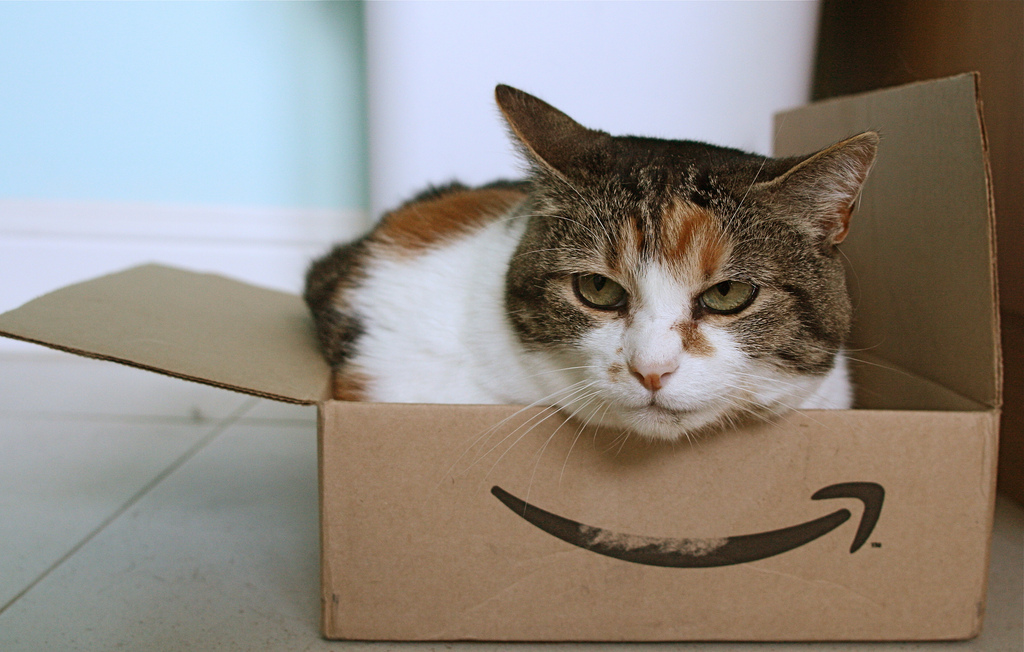How Trump and Bezos Can Bury the Hatchet
If Donald Trump is the dealmaker he touts himself as, he'll make public peace with Amazon CEO Jeff Bezos. Here's why.


The hottest political fight in America right now may not be between Donald Trump and Hillary Clinton, but between Trump and Jeffrey Bezos, who is the founder and CEO of Amazon.com and the owner of The Washington Post.
Look for it to end up like Trump's last big public feud with a high-profile media figure: in a conciliatory meeting like the one that Mr. Trump had with the Fox News anchor Megyn Kelly. The underappreciated fact is that on one of Trump's key issues—trade with China—Trump and Bezos have a mutual interest that overlaps more than either of them probably realize.
I realized this, strangely enough, not as a political reporter or analyst but as an Amazon customer. Two recent items I ordered from the online retailer showed up at my house not in the familiar Amazon logo packaging, but in envelopes mailed directly via China Post, one from Shenzhen, the other from Zhejiang, in China.
Welcome to the cutting edge of retail supply chain. Americans used to worry about job loss because our manufacturing jobs had turned into lower-wage positions as Walmart greeters or cashiers selling made-in-China goods. Then we worried about job-loss as the Walmart greeter and cashier jobs turned into temporary jobs picking out orders at Amazon warehouses (or overseeing robots that did that). Now we're approaching the day at which we don't need either the Walmart store or even the American-based Amazon warehouse or distribution center. Instead, the item just gets mailed directly to your house by some low-wage worker in China.
That scenario is a bit too much even for Bezos, who made his billions in part by ruthlessly and efficiently cutting costs to offer customers the lowest price in an Internet shopping environment where prices were more transparent and easily comparable than ever before.
Last year, Amazon's vice president for global public policy, Paul Misener, testified before a House of Representatives subcommittee, complaining about international agreements that give Chinese companies a cheaper deal on U.S. Postal Service delivery than American ones. "This disparity discriminates against American businesses shipping domestically. To allow fair competition in shipping to U.S. consumers and equitable treatment of American businesses, the international agreements must be reformed," Misener said.
The Amazon lobbyist sounded quite a bit like Trump, complaining about international trade deals that favor foreigners over Americans, and calling for those deals to be renegotiated.
"American businesses of all sizes end up paying more than Chinese companies for deliveries to American consumers," Misener testified. "Chinese companies end up getting a better deal from the USPS than American businesses. Amazingly, when combined with extremely low bulk shipping rates from China to U.S. transfer points, shipments from China to points throughout the United States are often cheaper than shipments entirely within the United States." In other words, it costs less to mail the item I bought directly from China than to deliver it from an American-based Amazon distribution center.
Misener called the deals that give the Chinese lower shipping costs than American companies a "serious problem."
The Bezos-owned Washington Post highlighted the issue in a 2014 article with the provocative headline "The Postal Service is losing millions a year to help you buy cheap stuff from China." (The Post reporter who wrote that story, Jeff Guo, told me that the idea for it did not come from Bezos.)
Earlier this month Trump issued a Facebook post stating, "Based on the incredibly inaccurate coverage and reporting of the record setting Trump campaign, we are hereby revoking the press credentials of the phony and dishonest Washington Post." In a statement, the Trump campaign amplified the message, complaining, "The Washington Post is being used by the owners of Amazon as their political lobbyist so that they don't have to pay taxes and don't get sued for monopolistic tendencies that have led to the destruction of department stores and the retail industry."
This triggered a spate of news coverage accusing Trump of dictatorial tendencies or of mistakenly underestimating the Post's editor, Martin Baron, who was a memorable character in the Oscar-winning movie about the Boston Globe's investigation of sex abuse by Catholic priests in Boston, Spotlight.
What it really demonstrates, though, is Trump's unfortunate knack for making enemies out of potential allies. Reporters, whether at Fox News or at The Washington Post, will be unruly. But if Trump is the dealmaker he touts himself as, he'll make public peace with Bezos the way he did with Kelly. Maybe part of their parley can be devoted to a presentation from Misener about the postal rate issue.


Show Comments (44)